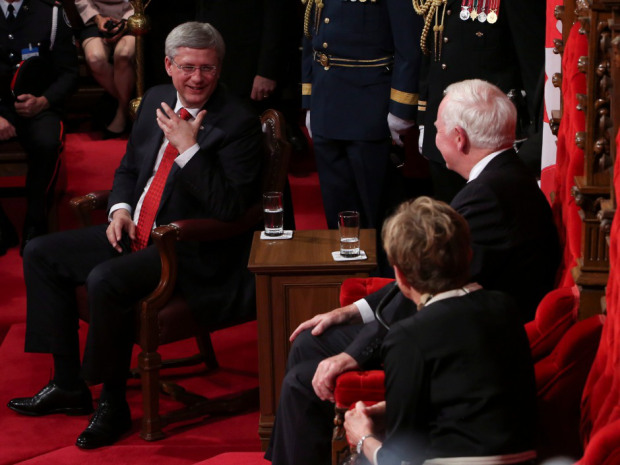In last week’s Throne Speech, the Conservative government promised to introduce a law which would require balanced federal budgets in ‘normal economic times’. Not only is the proposed measure poorly thought out, it is also ill-timed. If the government is serious about this proposal, they should instead put it to voters in 2015.
[captionpix align=”right” theme=”elegant” width=”280″ imgsrc=”http://natoassociation.ca/wp-content/uploads/2013/10/throne_speech.jpg” captiontext=”Governor General David Johnston delivers the Throne Speech, October 16 2013.”]
Inconsistent and ineffective
Balanced budget laws have been tried before, and have been soundly critiqued. The most common charge is that future governments can circumvent or easily repeal the law. The European Union, for example, has recently tightened its budget rules which impose penalties on member states running excessive budget deficits. Even with the EU’s cumbersome decision-making processes, in 2005 Germany sidestepped penalties and ran up large budget deficits, laying the foundation for the Eurocrisis.
In fact, the only real benefits of such laws appear to come from the ‘boogey man’ effect they have on democratically elected officials. Governments may be hesitant to ignore or repeal the law, as doing so would be damaging politically. Out of this fear, leaders may pay closer attention to state finances.
That said, Canada already has a budget watchdog – the Parliamentary Budget Officer. The PBO is a powerful mechanism for keeping government spending in check, and therefore renders a Canadian balanced budget law unnecessary.
Flawed from the beginning
The Throne Speech also assured listeners the requirement to stay in the black would only apply “during normal economic times.” Exactly what that would mean is unclear, as ‘normal economic times’ is largely unquantifiable. In the case of the European Union’s Stability and Growth Pact, thresholds on government spending are based upon entirely arbitrary averages. It seems that pinning down a specific threshold for action in Canada, be it unemployment levels or a fall in GDP growth, is quite unlikely.
[captionpix align=”left” theme=”elegant” width=”315″ imgsrc=”http://natoassociation.ca/wp-content/uploads/2013/10/throne_speech_senate.jpg” captiontext=”The Throne Speech was delivered in the Senate Chamber on Parliament Hill, October 16 2013.”]
Even if the details could be sorted out, the doctrine of prioritizing balanced budgets is itself highly controversial. There is no consensus among scholars or economists as to the relationship between debt burdens and economic growth. In fact, a highly influential paper from prominent Harvard economists critiquing deficit spending was recently torpedoed by an American doctoral student. In 2010, a paper by Reinhart and Rogoff pointed to significant declines in economic growth in countries with high government debt. However, when PhD student Thomas Herndon tried to replicate the results, he found the paper’s data excluded three countries with strong growth despite large deficits – Australia, New Zealand and Canada. Herndon’s findings and a separate follow-up study effectively discredited Reinhart and Rogoff’s case.
If there is little evidence to suggest that debt constrains growth, there is no reason to infringe upon governments’ discretion to spend on credit. Much as a business might borrow to finance an investment in future productivity, governments can use borrowed money to invest in infrastructure that facilitates new economic activity, leading to more tax-paying businesses that may help to pay back the loan in the future.
As Canada maintains a strong reputation among creditors, the cost to borrow funds is rather nominal. For example, Canada’s benchmark 5-year bond yields are consistently below 2%, making them among the lowest in the world.
The Throne Speech’s proposal would construct a political barrier to spending on credit, making it difficult for future governments to proactively manage economic growth. This would encourage laissez-faire policies as the default economic approach for the federal government. Prime Minister Harper’s support for a balanced budget law in Canada is thus a powerful statement about the federal government’s economic philosophy.
Timing is everything
Rather than being passed in a Conservative-dominated House, such significant legislation requires real debate and competing proposals from other parties. This sort of vetting can only be provided by an election. If the government is serious about this proposal, they should make it a part of their 2015 election platform. This would give taxpayers the opportunity to decide how they want public funds managed. Of course, in elections voters judge parties on their records, and when it comes to federal deficits, history does not favour the Conservatives.
Drop or delay it
At its core, the idea of a balanced budget law ignores the discretion governments require to borrow and spend on credit. Proponents of balanced budget laws might argue the ends justify the means, as politicians’ fear the political cost of repealing the laws, and so are more diligent in their budgets. But Canada already has a budget watchdog – the Parliamentary Budget Officer. The real effect of the proposed measure will be to incorporate right-wing economic doctrine into Canadian law. Such a significant initiative should be taken to voters in 2015, or dropped altogether.




